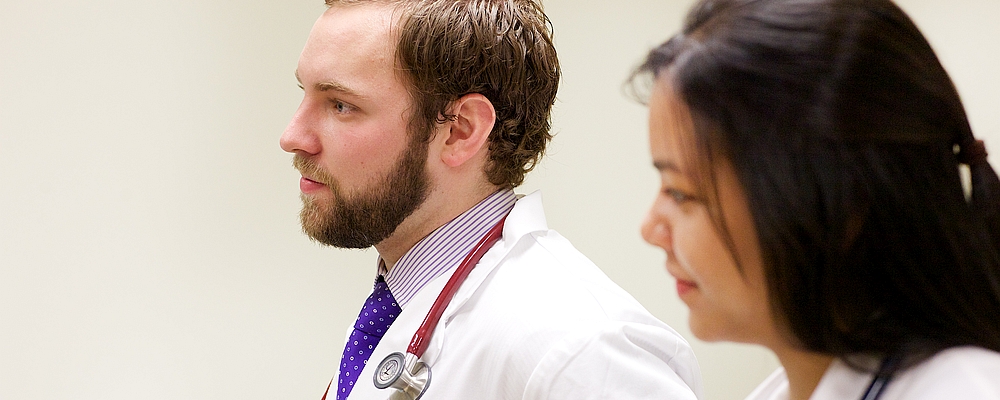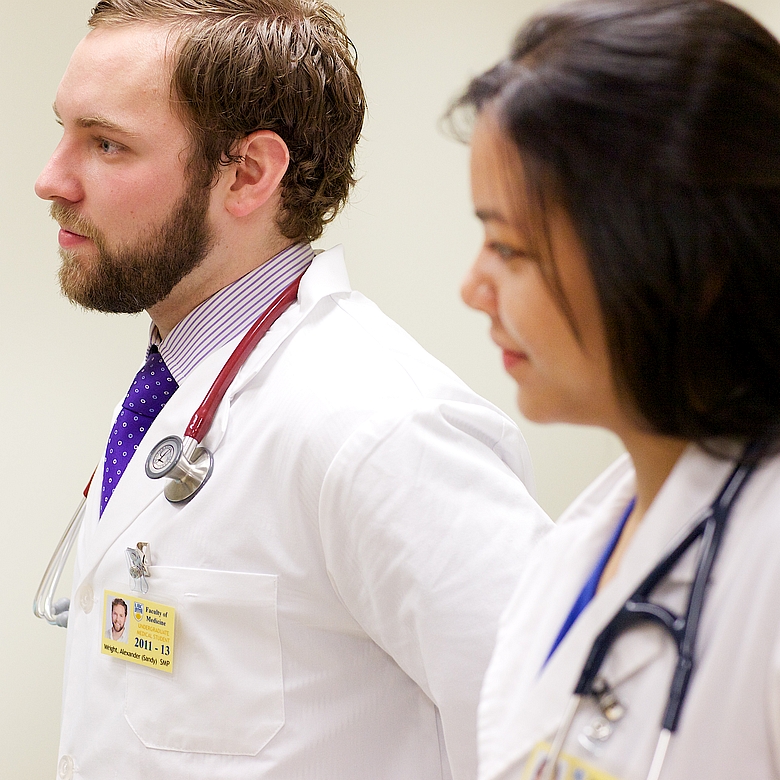Office of Student Affairs
The Office of Student Affairs provides supportive and confidential service for students throughout their medical school training. We maintain an open-door policy and an “arms-length” relationship with the academic team.
We promote students’ professional growth and well-being by…
- supporting students through all stages of their medical education from first-year orientation to graduation
- providing advice and advocacy for academic, personal, medical and financial issues
- connecting to appropriate campus and community resources to deal with these issues
- assisting with career planning in a timely, step-wise fashion during medical school
- supporting student initiatives that promote well-being (student-driven interest groups; health & wellness research, activities, and events)
- supporting student initiatives that involve the community, including charitable events
When should students contact Student Affairs?
Whenever a question, concern or need arises that may impact on a student’s studies or well-being
contact us early, before issues intensify (problems that seem small may become troubling or disruptive if not dealt with promptly)
Please don’t hesitate to contact us at any time.
Dr. Mike Bergunder
Assistant Dean, Student Affairs
Southern Medical Program
Email: mike.bergunder@ubc.ca
Carri Folk
Student Affairs and Admissions Coordinator
Southern Medical Program
Email: carri.folk@ubc.ca
Stacy Daley
Black Initiatives Coordinator
Southern Medical Program
Email: stacy.daley@ubc.ca
Jackson Traplin
Indigenous Initiatives Coordinator
Southern Medical Program
Email: jackson.traplin@ubc.ca
The Faculty of Medicine is committed to creating a learning and work environment conducive to optimal education, research, and clinical care.
If mistreatment happens:
- Make yourself safe: stay calm, remain polite, get yourself out of the situation. If you need to call security or 911, do so. You shouldn’t go back if you won’t be safe.
- Talk to someone you trust
- This initial discussion can help
- Some suggestions: peer, trusted faculty member, family, friends, formal student representatives, religious leader, family doctor
- Document what happened from your perspective for your future reference
- Talk to someone within UBC and/or the Faculty of Medicine. You are encouraged to speak initially with someone within your program or at your site.
- Report the mistreatment by contacting one of the following people or use the online reporting form.
Visit the Mistreatment Help website for more information.
Student Resources
- UBC Office of Student Affairs
- Mistreatment Help
- Financial Support
- Counselling and Support
- UBCO Campus Resources
- UBCO Health and Wellness Centre
- Physician Health Program, British Columbia
Professional Resources
The Southern Medical Program’s (SMP) Equity, Diversity, & Inclusion (EDI) Committee is a resource for students, staff, and all other community members to help address and reform our healthcare and education community so that all can succeed. Breaking down these barriers is not only a necessity, but also a limitless endeavour that needs us all to come together with humility and curiosity.
The SMP EDI Committee has funding of up to $5,000 per project available to support student, staff and/or faculty-led projects aimed at enhancing EDI within the SMP community. Applications are open to current SMP students, Centre for Chronic Disease Prevention and Management graduate students/research trainees, as well as Faculty of Medicine Interior faculty, staff, and student groups.
The Southern Medical Program has a librarian based on the UBC Okanagan to support student research. Group and individual sessions are available on a range of topics:
- searching the medical literature
- getting the most out of PubMed
- citation and data management
- evaluating and selecting journals for potential publication, and
- navigating the realm of literature reviews from rapid reviews to comprehensive systematic reviews.
If you have questions, or would like to book an appointment, contact Jane June at jane.jun@ubc.ca.
Other Library Resources
SMP students have numerous opportunities to engage in research opportunities in the BC Interior including:
- Flexible and Enhanced Learning (FLEX) Course
- Summer Student Research Projects
- Studentships with the BCCA-SAHCSI or British Columbia Cancer Agency, Sindi Ahluwalia Hawkins Centre for the Central Southern Interior
- The Colin and Lois Pritchard Foundation Studentships at the BCCA-SAHCS
For more information, visit Student Research.

